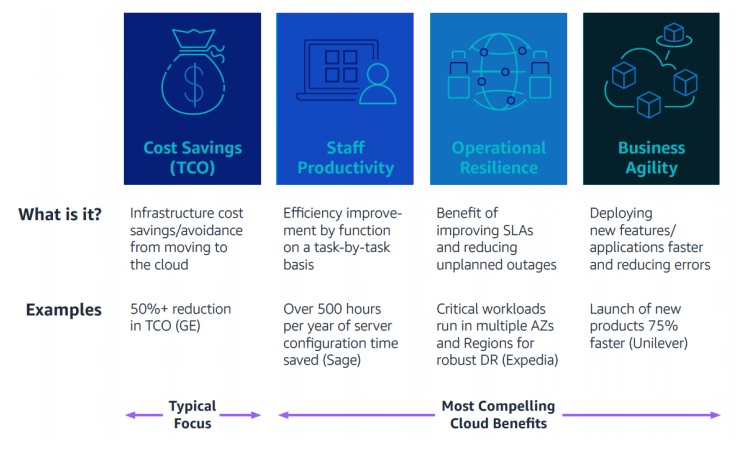Why AWS?
The AWS Cloud Value Framework was developed by AWS Cloud Economic by working with more than 100 enterprise customers and analysing over 1,500 public AWS case studies. The results show four main areas in which AWS customers are realising business value by moving to cloud computing:
Cost Savings - Infrastructure cost savings/avoidance from moving to the cloud e.g. 50%+ reduction
in TCO (GE)
Staff Productivity - Efficiency improvement by function on a task-by-task basis e.g. Over 500 hours per year of server configuration time saved (Sage)
Business Agility - Deploying new features/applications faster and reducing errors e.g. Buildouts and
deployments happen 5x faster (Intuit)
Operational Resilience - Benefit of improving SLAs and reducing unplanned outages e.g. Critical workloads run in multiple AZs and regions for robust DR (Expedia)
Each of these four elements are crucial in determining an organisation’s ability to compete and succeed in a fast-moving business environment, to achieve differentiation, accelerate innovation and make the most of the talent inside an organisation.

Cost Savings
In a traditional IT set-up, adding capacity to an organisation’s data centre is a slow process. It demands a long lead time, as well as accurate forecasting (typically six to nine months from initiation to availability) – and companies usually over-provision to avoid being unable to meet demand. With cloud computing, organisations pay only for the resources they need, and capacity can be instantly added and released on demand.
Staff Productivity
When an organisation operates its own data centre, a large amount of resources are dedicated to generic, IT housekeeping tasks: acquiring, installing and configuring resources, maintaining equipment. When IT moves to the cloud, many of these tasks are no longer required, freeing up IT staff to focus on higher level tasks that differentiate the business, such as new product development and improved customer service.
Business Agility
The traditional IT model places constraints on innovation and agility.
Cloud supports a rapid, agile approach to IT that drives competitive advantage. Developers can instantly provision resources and begin writing code, without waiting for the budget needed to deploy the full infrastructure stack that would be needed for a full-service offering. They can avoid costs because they can shut down instances when they are no longer needed.
Operational Resilience
By using cloud services, organisations can increase their operational resilience and avoid the high costs of IT disruption. AWS helps organisations improve the operational resilience in four key areas: infrastructure, operations, security, and software.
Infrastructure - AWS provides a highly resilient infrastructure to protect against hardware failures, natural disasters and power outages. Every compute instance is served by two independent power sources, each with utility, UPS and backup generator power, virtually eliminating network outages. These approaches are standard with AWS but would be costly and complex to implement in an on-premises data centre.
Operations - AWS enables organisations to automate error-prone human elements with tools such as AWS CloudFormation and AWS Service Catalogue, thereby improving reliability. Furthermore, AWS Service Catalogue provides organisations with visibility into the utilisation and performance of their IT network, and is able to quickly identify and address any issues
Security - AWS supports high levels of security, and continuously applies best-of-breed protections to its global infrastructure. With AWS Identity and Access Management (AWS IAM), organisations can securely control access to AWS services and resources, eliminating threats created by rogue servers or unauthorised users.
Software - AWS provides mechanisms to reduce the likelihood of software issues that could cause outages. AWS Managed Services automates common activities such as change requests, monitoring, patch management, security and backup services, and provides full-lifecycle services to provision, run and support infrastructure. IDC found a 94 percent reduction in unplanned downtime for AWS customers versus their previous on-premises implementations.



